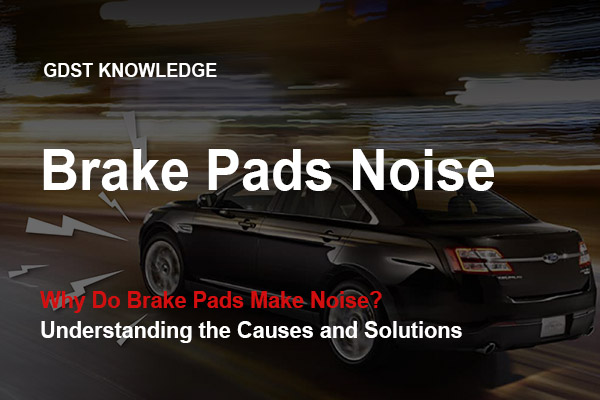Noisy brakes can be more than just an annoyance; they can signal underlying issues with your vehicle’s brake system. In this comprehensive guide, we’ll explore the common reasons why brake pads make noise and provide actionable solutions for distributors and wholesalers.
Brake pads often make noise due to wear, improper installation, or environmental factors like moisture and debris. Recognizing these sounds early can prevent future brake system damage and ensure driving safety.
Let’s go deeper into the causes and fixes for noisy brake pads.
How Can I Stop My Brakes from Making Noise?
To stop your brakes from making noise, you can follow these steps:
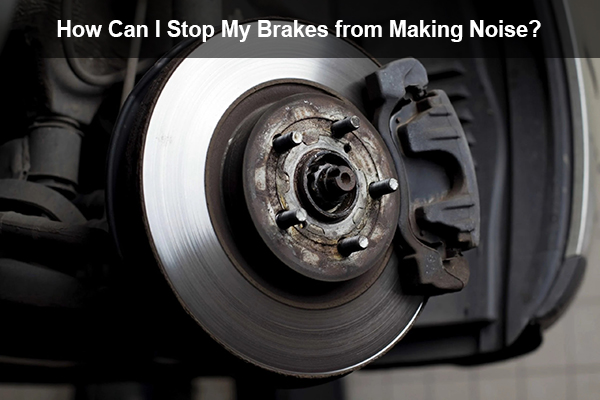
- Inspect the brake pads: Check for wear and replace them if they are worn out. Pads with less than 1/4 inch of thickness should be replaced.
- Check for debris: Sometimes small rocks or debris can get caught between the brake pad and the rotor, causing noise. Remove any debris you find.
- Lubricate contact points: Apply high-temperature brake grease to the back of the brake pads and the points where they contact the caliper. This can reduce noise caused by vibration.
- Ensure proper installation: Make sure that all components of the brake system are installed correctly and securely. Loose parts can lead to noise.
- Check the rotors: Warped or damaged rotors can cause brake noise. Inspect the rotors for any signs of damage or excessive wear and replace them if necessary.
- Use anti-squeal products: There are products like anti-squeal shims or sprays that can be applied to the brake pads to help reduce noise.
- Consider the type of brake pads: Some brake pads are quieter than others. If you have metallic pads, switching to ceramic pads might reduce noise, as they tend to be quieter.
- Professional inspection: If the noise persists after trying these steps, it might be best to have your brake system inspected by a professional mechanic to diagnose and fix the problem.
Is Driving with Noisy Brake Pads Safe?
Driving with noisy brake pads is safe if the noise is caused by minor issues such as slight wear or dust/debris.
But the noise may be also a sign of serious problems that would affect the braking performance of your vehicle.
Here’s what you need to consider:
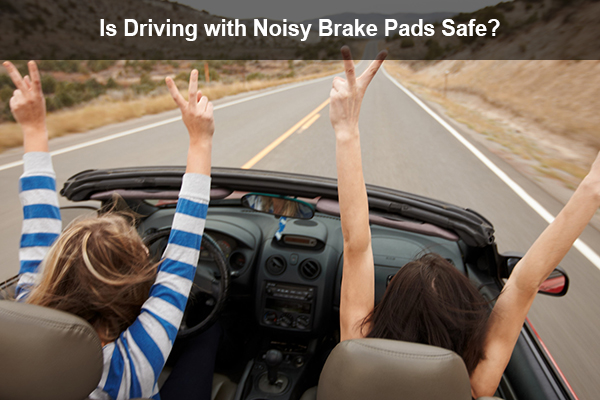
- Identify the cause: It is necessary to identify why the brakes make noise. If it is a slight squeak due to dust, it may not be a safety problem. But if there is grinding or constant loud noise, it may mean the brake pads, rotors, or other parts are severely worn or damaged.
- Brake pad thickness: If the brake pads are worn down to the minimum thickness, please replace them immediately. Driving with worn-out brake pads may cause brake failure. It is dangerous!
- Check for damage: Grinding or growling noises may indicate the brake pads are completely worn through and the metal backing is rubbing against the rotor. This may damage the rotor and greatly reduce braking efficiency. It is dangerous!
- Effect on braking performance: If you find any changes in braking performance, such as longer stopping distances, vibration when braking, or the car pulling to one side, it may mean there is a serious problem with the brake system.
- Regular maintenance: It is very important to inspect and maintain the brakes of your vehicle regularly. If you are not sure about the condition of the brakes, or if the noise persists and is accompanied by other symptoms, please have the brakes inspected by a professional mechanic as soon as possible.
What Does Noise from Brake Pads Indicate?
Noise from brake pads can indicate several different issues, ranging from normal operation to potential safety concerns.
Understanding the type of noise and its cause can help determine the appropriate action.
Here are some common noises from brake pads and what they might indicate:
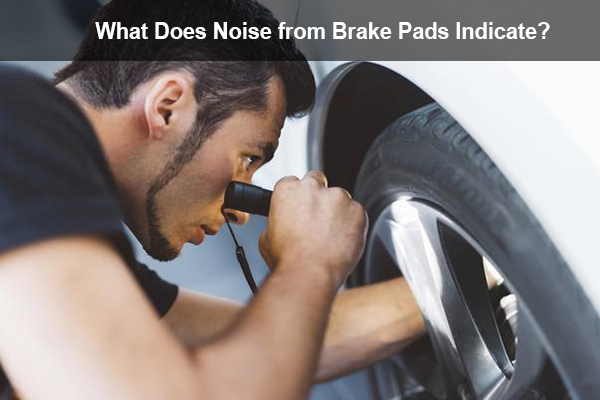
- Squealing or Squeaking: This is often caused by vibration between the brake pad and the rotor. It can occur due to dust, debris, or if the brake pads are hardening with age. Some brake pads have wear indicators that make a high-pitched squealing noise when it’s time for them to be replaced.
- Grinding: A grinding noise usually indicates that the brake pads have worn down completely, allowing the metal backing of the pad to rub against the rotor. This can damage the rotor and significantly impair braking performance.
- Thumping or Pulsing: If you feel a thumping or pulsing sensation through the brake pedal accompanied by noise, it could indicate warped rotors. This warping can cause uneven contact with the brake pad, leading to noise and vibration when braking.
- Clicking: Some vehicles are designed with brake pads that fit into a specific position. If there’s a clicking noise, it might mean the brake pads are not seated properly in their mounting, leading to noise during operation.
- Rattling: A rattling noise can occur if the anti-rattle clips, shims, or caliper hardware are worn or not installed correctly. These components help hold the brake pads in place, and if they’re failing, the pads may rattle during driving or braking.
- Scraping: A light scraping noise might not be a sign of worn-out pads but could indicate that a foreign object (like a small rock) is caught between the brake pad and the rotor.
Is it Normal to Hear Brake Pads?
Normally, there is noise when you are using the brake pads, especially under some conditions.
But the type and frequency of the noise can tell you whether it is the normal characteristic or a potential problem:
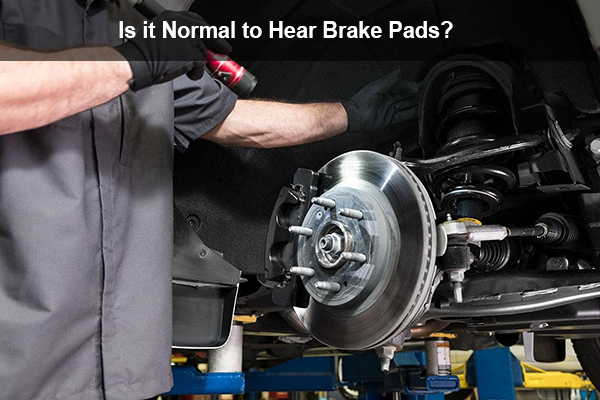
- Normal brake noise: Sometimes you may hear a slight squeaking or squealing from the brakes. This is normal when you gently apply the brakes or under some special conditions, like wet or dusty. It’s because of the normal friction between the brake pads and rotors.
- Wear indicators: Many brake pads have wear indicators inside. When the pads are worn down and need replacing, there will be a high-pitched squealing noise. It’s intentional to remind you to check the brakes.
- Occasional noises: If you hear noises like a slight grinding or squeaking only occasionally, and it doesn’t persist, it might not be a big problem. For example, after a car wash or rain, you might hear the brakes make a noise until the moisture has evaporated.
- Persistent or loud noises: If the brake noise is loud, occurs frequently, or is accompanied by grinding, pulsing, or changes in brake performance, it may indicate a problem, such as worn pads, damaged rotors, or other brake system issues.
Why Do Brake Pads Make Noise While Driving?
Brake pads can make noise while driving due to various reasons, ranging from normal operational sounds to indications of potential issues.
Here are some common reasons why brake pads might make noise:
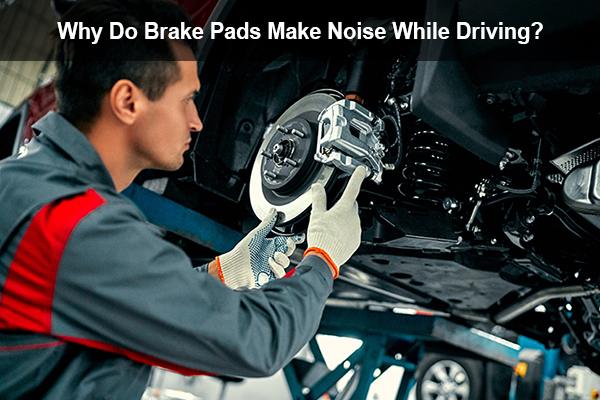
- Dust and debris: The accumulation of dust, dirt, or small pebbles between the brake pad and the rotor may cause squeaking or grinding noises. These particles may be stuck in the brake system and lead to noise when you apply the brakes or even during regular driving.
- Wear indicators: Many brake pads are equipped with wear indicators. When the pads are almost worn out, the wear indicators will make a high-pitched squealing noise. That’s an alarm to tell you that the pads need to be replaced.
- Vibration: Noise can also be caused by vibration between the brake pads and the calipers or rotors. If the brake pads are not installed tightly or the anti-rattle clips or shims are worn or lost, it will lead to squealing or rattling noise.
- The material composition: The material for the brake pad may influence the noise of the brake pad. For example, the metallic or semi-metallic brake pad may be noisier than the ceramic brake pad since they are harder and more abrasive, which may cause more noise under certain conditions.
- Rotor condition: Worn, warped, or poorly surfaced rotors will cause brake pad noise. If the rotor surface is uneven, it will cause the brake pads to contact with the rotor intermittently, and then make squeaks or groans.
- Brake pad quality: Low quality brake pads or not the right fit for the vehicle, may be more prone to make noise. High-quality, vehicle-specific brake pads are less likely to produce excessive noise.
- Lack of lubrication: Proper lubrication of brake components, such as caliper pins and the area between the brake pad backing and caliper piston, is important to avoid noise. Without enough lubrication, these parts may generate squealing or grinding noise.
Can New Brakes Make Noise When Stopping Slowly?
Yes, new brakes may generate noise when stopping slowly, particularly in the early stage after installation.
It is a normal phenomenon for new brake parts to have a break-in process.
Here is the reason why:
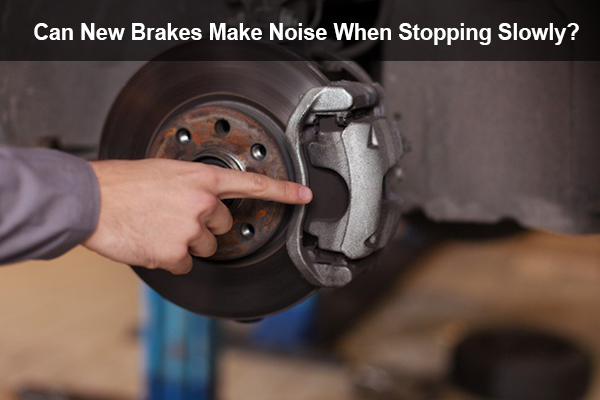
- Bedding-in process: The new brake pads and rotors need to go through a bedding-in process. It is to transfer a thin layer of pad material onto the rotor surface. This can help to establish good contact between the pads and rotors, and enhance the braking performance. During this period, you might hear a squeaking or squealing noise when you brake slowly.
- Surface coating: New rotors often come with a protective coating that prevents rust during storage and shipping. This coating may cause noise until it wears off through normal braking actions.
- High-friction materials: New brake pads, particularly those made from high-friction materials like metallic or semi-metallic compounds, might be noisier at first until they are fully bedded in and have adapted to the rotor surface.
- Improper installation: If the noise continues after the bedding-in period, it may be caused by the improper installation of the brake components. For example, if the pads are not well seated, or the shims/clips are missing or installed wrongly, it will cause noise during braking.
- Manufacturing residues: Sometimes, there are some residues from the manufacturing process on the pads or rotors. It may cause some noise until fully worn off during the initial use.
Conclusion
When brake pads make noise, it’s like they are talking to us. They tell us something needs checking or fixing. For distributors and wholesalers, knowing what these noises mean helps in providing better service and advice to customers. Regular checks and understanding these sounds can prevent bigger problems with the brakes and keep everyone on the road safe.

